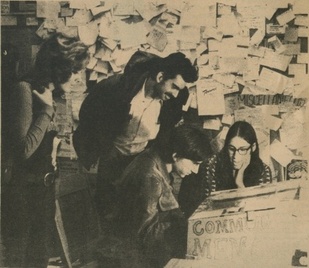While LocalWiki may be new, the underlying philosophy of the project can be found all over. Here, we collect interesting non-technical historical and social inspiration1:
Community Memory project, Berkeley, California (1970s)
 Community Memory terminal at Leopold's Records, Berkeley, CA, 1973. Image CC-BY-SA Mark Szpakowski.
Community Memory terminal at Leopold's Records, Berkeley, CA, 1973. Image CC-BY-SA Mark Szpakowski.
From Wikipedia:
Community Memory was created by Efrem Lipkin, Mark Szpakowski, and Lee Felsenstein, acting as The Community Memory Project within the Resource One computer center at Project One in San Francisco. This group of computer savvy friends and partners wanted to create a simple system that could function as a source of community information.
CM was conceived as a tool to help strengthen the Berkeley community. Their brochure states that:
"Strong, free, non-hierarchical channels of communication--whether by computer and modem, pen and ink, telephone, or face-to-face--are the front line of reclaiming and revitalizing our communities."
Collective Action, Civic Engagement, and the Knowledge Commons (2007)
In In Understanding Knowledge as a Commons (2007), Peter Levine discusses the need for a locally-specific knowledge commons that aims engage ordinary people in the production and sharing of knowledge:
"The authors advocate better ways to create, disseminate, preserve, and organize knowledge as a common resource. While I certainly share the goals of those chapters, the focus here is somewhat different. I take the process of creating public knowledge as an additional good, because such work builds social capital, strengthens communities, and gives people skills that they need for effective citizenship. If this is correct, then we should aim to include as many people as possible in the collaborative creation of “free” (i.e., open-access) knowledge. Not only scholars and librarians, but ordinary people should be knowledge creators."
...
"Thus, there are important benefits from local associations. But they are not thriving online, as evidenced by the shortage of compelling websites produced by voluntary groups for specific localties. People want the chance to do collaborative public work, to represent and experience their distinctive local cultures, and to engage in sustained dialogue – but no one has found ways to make money from hosting such activities. Commercial sites intended for geographic communities are full of advertising and generic news and entertainment, but they have few public contributions. Neighborhood associations, voluntary organizations, religious congregations, and other groups that do public work within geographic communities have benefited from establishing web pages. But most of the actual sites these groups have created amount to simple online brochures, no more valuable to their visitors than printed postes would be." (264)
1. Inspiration in the sense that they inspire! Not that these examples necessarily were the or an inspiration for the original creation of the LocalWiki project.


